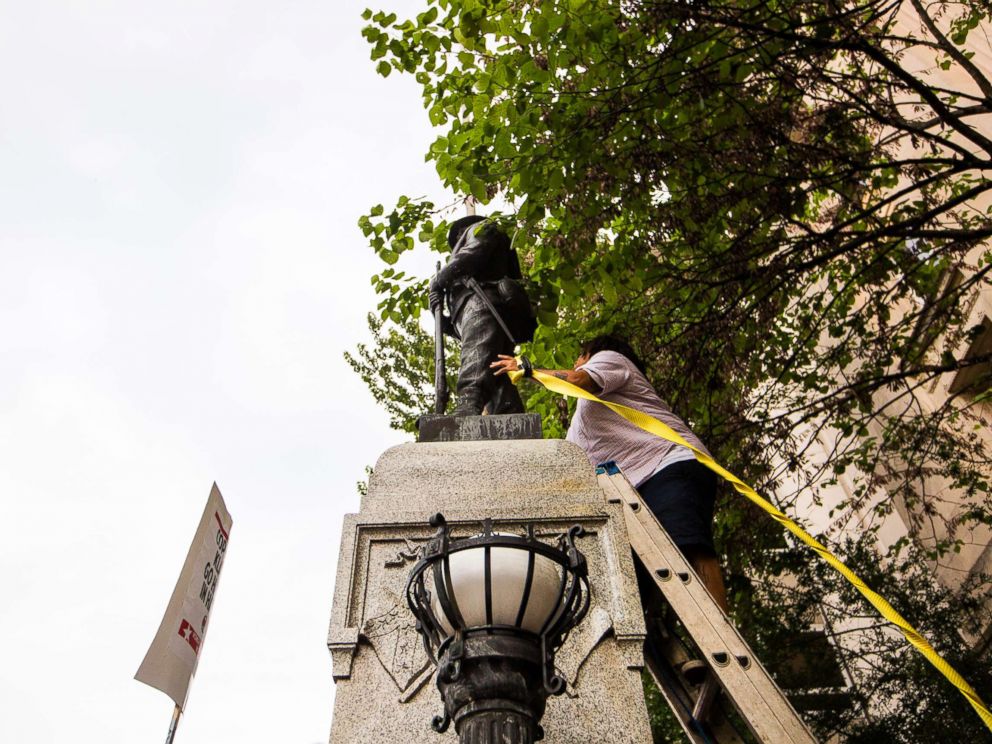Takiyah Thompson, a 22-year-old college student, was arrested Tuesday after confessing to taking part in the toppling of a Confederate monument outside the Durham County courthouse Monday evening. The video circulated identifying Thompson as the activist who climbed a ladder to the top of the statue to tie a rope around its neck before the crowd tore it down.

Photo: Breitbart.com
Durham, North Carolina is a part of our country still riddled with a troubled and difficult history of racial unrest—it was the catalyst for battles over segregation, the grounds for the formation of the Ku Klux Klan and that statute was one of many constant reminders of the evils of racism that haunts that state. But also, was symbolic of how these evils can be buried under a sense of American exceptionalism and patriotism that act as a stronghold for whiteness in America.
As the statute hit the ground, its bronze crumbling into pieces upon impact, the crowd cheering, I can only imagine the euphoria in that moment. Like many in North Carolina and around the country, I witnessed the vile and devastating ways, racism rears its ugly head in 2017 during the white nationalist rally in Charlottesville, Virginia. A rally incited by the removal of a Confederate statue of Robert E. Lee from a downtown park.
Images hit airwaves and on social media of mobs of white men wielding tiki-torches and marching through the University of Virginia screaming “White Lives Matter”—all culminating into a major rally that brought out alt-right, white supremacist groups there to reclaim their whiteness, their power in this country. My blood boiled watching these events unfold, to see white supremacists carrying poles wrapped with the Confederate flag and men in bulletproof vests, strapped with sniper rifles walking through the streets with ease and some even shaking the hands of white officers as they walked by.
I found myself in a daze of rage, unable to clearly articulate how the events of Charlottesville and the effigies of white nationalism that remain a fixture to many states have shaken me to my core. As the President of the United States took his sweet, leisurely time to call out white nationalists and hate groups as racists and evil and then in typical fashion of white privilege, when confronted with race, then blamed both sides for violence—I was reminded of how not even the leader of this country defends my humanity.
But when I saw my beautiful black sister Takiyah Thompson climbing that ladder, throwing a rope around that Confederate statute and watching as a crowd toppled it the ground, I felt an ease in my heart. An ease that comes when realizing that a swift change is approaching. It was the same gut feeling as I watched just two years ago, a young black woman doing something very similar and yet nearly unthinkable. When Brittany “Bree” Newsome approached the South Carolina statehouse and scaled a 30-foot flagpole and took down the Confederate flag—she inspired change in the face of tragedy.
Newsome pushed then-South Carolina Governor Nikki Haley to sign a bill removing the flag from the Statehouse grounds permanently and this year, New Orleans has removed several Confederate monuments from across the city.
James Baldwin said in his timeless and searing work 'The Fire Next Time'—a work that spurred the Civil Rights Movement, “—at the center of this dreadful storm, this vast confusion, stand the black people of this nation, who must now share the fate of a nation that has never accepted them, to which they were brought in chains. Well, if this is so, one has no choice but to do all in one’s power to change that fate, and no matter what risk—eviction, imprisonment, torture or death—one must be careful not to take refuge in any delusion—and the value placed on the color of the skin is always and everywhere and forever a delusion.”
I am a believer in the interesting parallels of this world—that whatever goes up must come down. I am also a very strong believer that history has shown change is, in fact, inevitable but is only when we take matters into our own hands and we forcibly push the tides of change do we yield results. In an interview with the New York Post, Takiyah Thompson stated “People can be mobilized and people are angry. And when enough people are angry, we don’t have to look to politicians to sit around in air conditions and do nothing when we can do things ourselves.”
Those exact words could not resonate more than in this very moment. For here we are at the center of a moral arc that bends towards justice, and everything is in our hands. I salute Takiyah Thompson for her fearlessness, for being an agent of change, for pushing others to not falter in our duty to right the wrongs of this country. For we are a powerful people when we are aware of how whiteness is, in fact, an invention and these statues are merely objects created to uphold and justify whiteness—but like all things can be easily brought down.
